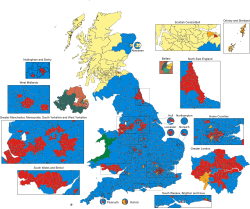User:WanukeX/sandbox
Notional 2019 results[edit]

The election will be contested under new constituency boundaries established by the Sixth Boundary Review in 2023. Consequently, media outlets tend to report seat gains and losses as compared to notional results. These are the results if all votes cast in 2019 were unchanged, but regrouped by new constituency boundaries.[1] Notional results in the UK are always estimated, usually with the assistance of local election results, because vote counts at parliamentary elections in the UK do not obtain figures at any level more specific than that of the whole constituency.
In England, seats will be redistributed towards Southern England, away from Northern England, due to the different rates of population growth. North West England and North East England will lose two seats each whereas South East England will gain seven seats and South West England will gain three seats.[2] Based on historic voting patterns, this is expected to help the Conservatives.[3] Based on these new boundaries, different parties would have won several constituencies with unchanged names but changed boundaries in 2019. For example, the Conservatives would have won Wirral West and Leeds North West instead of the Labour Party, but Labour would have won Pudsey and Heywood & Middleton instead of the Conservatives. Westmorland and Lonsdale, the constituency represented by former Liberal Democrat leader Tim Farron, is now notionally a Conservative seat.
In Scotland, 57 MPs would be elected, down from the 59 in 2019, with the following notional partisan composition of Scotland's parliamentary delegation:[4] The Scottish National Party would remain steady on 48 seats, despite two of their constituencies being dissolved. The Scottish Conservatives' seat count of six would likewise remain unchanged. Scottish Labour would have retained Edinburgh South, the sole constituency they won in 2019. Had the 2019 general election occurred with the new boundaries in effect, the Scottish Liberal Democrats would have only won two seats (Edinburgh West and Orkney and Shetland), instead of the four they did win that year, as the expanded electorates in the other two would overcome their slender majorities.
Under the new boundaries, Wales will lose eight seats, electing 32 MPs instead of the 40 they elected in 2019. Welsh Labour would have won 18 instead of the 22 MPs they elected in 2019, and the Welsh Conservatives 12 instead of 14. Due to the abolition and merging of rural constituencies in West Wales, Plaid Cymru would have only won two seats instead of four. Nonetheless, the boundaries are expected to cause difficulty for the Conservatives as more pro-Labour areas are added to some of their safest seats.[5]
In Northern Ireland, the notional results are identical to the actual results of the 2019 general election in Northern Ireland.
| Party | MPs | |||
|---|---|---|---|---|
| 2019 actual result | 2019 notional result | Change | ||
| Conservative | 365 | 372 | ||
| Labour | 202 | 200 | ||
| SNP | 48 | 48 | ||
| Liberal Democrats | 11 | 8 | ||
| DUP | 8 | 8 | ||
| Sinn Féin | 7 | 7 | ||
| Plaid Cymru | 4 | 2 | ||
| SDLP | 2 | 2 | ||
| Green | 1 | 1 | ||
| Alliance | 1 | 1 | ||
| Speaker | 1 | 1 | ||
WIP 43rd Parliament of Ontario Seating plan[edit]
- ^ "2023 Boundary Review – Notional Election Results (GE2019)". Sayers Insights. 2023. Retrieved 2023-09-14.
- ^ "Boundary review: Winners and losers from proposed changes". BBC News. 2021-06-08. Retrieved 2023-10-06.
- ^ "Tories could gain most from new election map". BBC News. 2022-11-08. Retrieved 2023-10-06.
- ^ Media, P. A. (2022-11-08). "Scotland to lose two Commons seats in latest Boundary Commission proposals". The Guardian. ISSN 0261-3077. Retrieved 2023-10-06.
- ^ "Map of Welsh MPs seats redrawn as number to be cut to 32". BBC News. 2023-06-28. Retrieved 2023-10-06.

